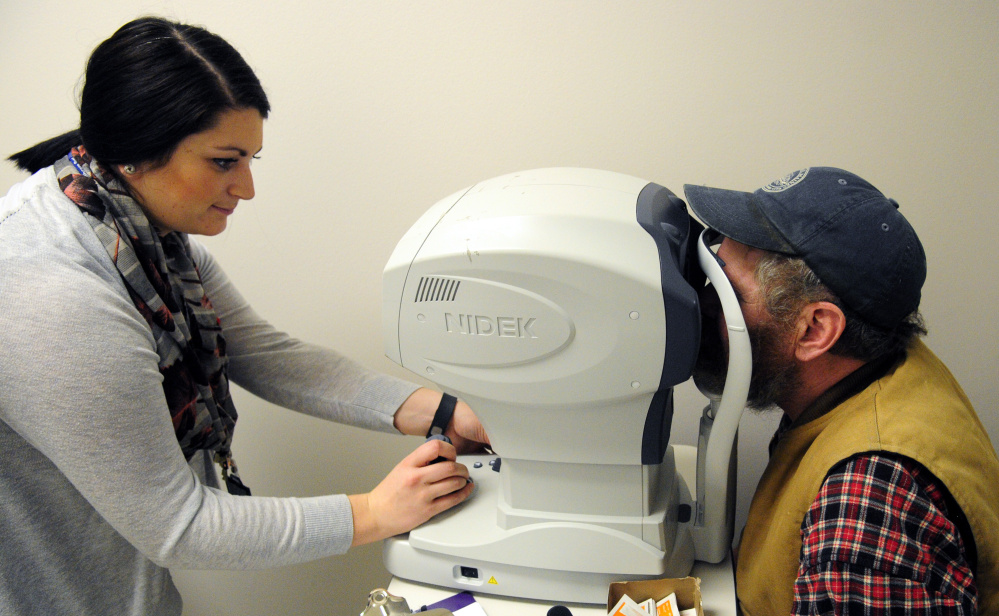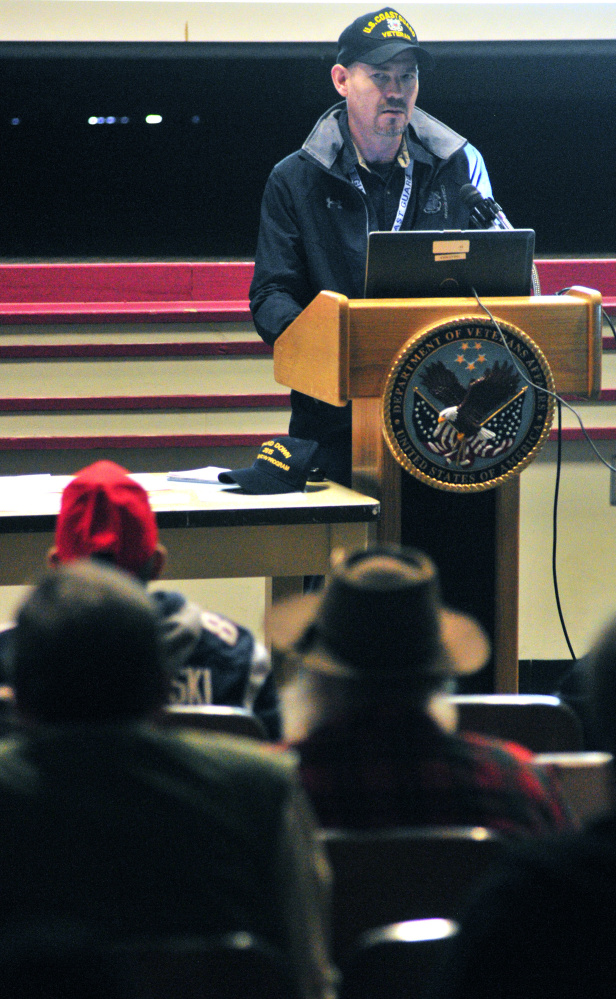TOGUS — Two years ago Aaron Brooker walked into the Homeless Veteran Stand Down at VA Maine Healthcare System-Togus a broken man.
Saturday morning Brooker was back at the annual event held to help provide veterans who are homeless with services, clothing, other items, medical care and information on how to find housing, but not as a homeless participant. This time, the U.S. Coast Guard veteran was there as a tour guide, and he got the day off to a strong start by urging his fellow veterans to take advantage of the opportunity before them, as he did then, to escape life on the streets.
“I arrived at Building 200 a broken man. I was homeless and unemployable,” Brooker told about 66 homeless veterans from around the state, and 190 volunteers there to help them Saturday at Togus. “It was a lifeline that I grasped. To my fellow veterans, I offer a challenge. Accept this for what it is. Don’t let pride get in your way. We don’t have to live in the streets. There are opportunities if we choose to be humble enough to accept them.”
Brooker, now employed and living in Augusta, then helped show at least one of the veterans around the veterans’ hospital at Togus, to stations offering medical care and screening; determination of whether the person might qualify for MaineCare, food stamps or other assistance; employment counseling; information on and applications for both transitional and permanent housing opportunities; dental care; legal advice; vision screening and, if needed, free glasses; mental health counseling; substance abuse counseling; advice from the clergy; help with prosthetics; lunch on-site and a meal to go; boots; toiletries; and clothing.
Brian Sexton, 55, who served in the Navy from 1978 to 1994, came to the event for the first time in his life, from the Bread of Life shelter in Augusta, seeking, in particular, help gaining employment and transitional housing. He was an aviation electrician in the Navy, working on “aircraft carriers and everywhere else they needed us.”
He said some of the biggest reasons veterans are homeless are the lack of jobs, jobs that are only part time and pay low wages, and employers that, given the bad press and attention, are afraid to hire veterans because of concerns about post-traumatic stress disorder.
“Until there are more jobs, with better pay, more people are going to become homeless,” Sexton said.
William Capistran, who is living in an efficiency apartment at Huot House in Saco, which is transitional housing for veterans, was at the Stand Down seeking help finding employment. He spent most of his career as a mining engineer, but the 60-year-old said “that’s a young man’s work,” and said he’s struggled to find work even though it is something he “tries to chase down daily.”
He said he has a voucher to help him get permanent housing, but because of the tight rental market, he hasn’t been able to find a place he can afford, even with the voucher, because rents are more than the voucher provides.
He served in the Army from 1973 to 1976 and again with the Maine National Guard from 1988 to 2011, including a tour in Iraq with the 133rd Engineer Battalion. He, and many others, said the volunteers and workers at Togus for the Stand Down on Saturday were helpful, and he was thankful.
Carol Kulesza, Healthcare for Homeless Veterans program coordinator at Togus, said the Homeless Veteran Stand Down, in its 18th year at Togus, is done across the country. Some of them take place in VA centers, others in communities. She said one of the ideas behind it is to bring community and VA service providers to one place so veterans who are homeless have “one-stop shopping” for services and things that can help them escape homelessness, and make their lives better.
“Stand down” is a military term, according to a VA website, referring to the period of time a soldier leaves an active combat area in order to rest and regain strength — a time to relax after a period of readiness.
“It’s all about taking a day, setting our lives aside, to just be here a few hours, shake a few hands and maybe get some good things started,” she said of the event, which drew 190 volunteers.
Susie Whittington, a social worker in the homeless veterans program at Togus, said so many volunteers wanted to help at the event that organizers had to turn some away. She said the Augusta Elks Lodge made turkey dinners with all the trimmings for about 300 people, including homeless veterans, volunteers and workers.
Rob Gaston, of Waldoboro, who was in the Coast Guard from 1973 to 1975 and is one of many members of his family who served in the military, got some reading glasses and a prescription for glasses, had a medical appointment and hoped to get some advice or other assistance to help him save his 1829 former sea captain’s home from foreclosure. He said the house is “a beast” to take care of and has broken windows, only wood heat, and other problems. Showing the holes in his shoes, he said he also hoped to get a pair of boots.
Gaston was assisted in finding his way around the Togus complex by Jerry White, of Waterville, a former patient and employee and current volunteer at Togus who earned the Purple Heart in 1969 for wounds suffered while serving in the Army in Vietnam. He said he’s been coming to help at the Stand Down event for many years. He said volunteering there is a good chance to see a lot of his friends.
Veterans were given rides to the event from numerous locations across the state.
Sixty-six homeless veterans sought help Saturday, a decline from last year’s 82 veterans.
Jim Doherty, a spokesman for the veterans’ hospital, said the number of participants tends to vary each year, generally between 65 and 85.
Kulesza said the recent trend is a decreasing number of homeless veterans in Maine, at least according to an annual report on veterans in homeless shelters. She said in 2012 there were 534 veterans in homeless shelters, in 2013 there were 499, and in 2014 there were 438.
She said a partnership with Housing and Urban Development and VA Supported Housing, in which the VA provides case management and veterans receive Section 8 federal housing vouchers, has helped.
But she said there are still high occupancy rates at three transitional housing programs in Maine, noting, “That shows we still have the need.”
She and Whittington said they’d love it if there were no need for the Homeless Veteran Stand Down because there were no homeless veterans.
“My greatest wish for you is I don’t see you here next year as a homeless veteran,” Whittington told participants. “Please come back as a volunteer. There are resources here that can change your life.”
She noted the event is a hand up, not a handout.
“Take today and make it better than yesterday,” she said. “Thank you for your service to our country. It’s our turn to help you.”
Keith Edwards — 621-5647
Twitter: @kedwardskj
Copy the Story LinkSend questions/comments to the editors.





Success. Please wait for the page to reload. If the page does not reload within 5 seconds, please refresh the page.
Enter your email and password to access comments.
Hi, to comment on stories you must . This profile is in addition to your subscription and website login.
Already have a commenting profile? .
Invalid username/password.
Please check your email to confirm and complete your registration.
Only subscribers are eligible to post comments. Please subscribe or login first for digital access. Here’s why.
Use the form below to reset your password. When you've submitted your account email, we will send an email with a reset code.